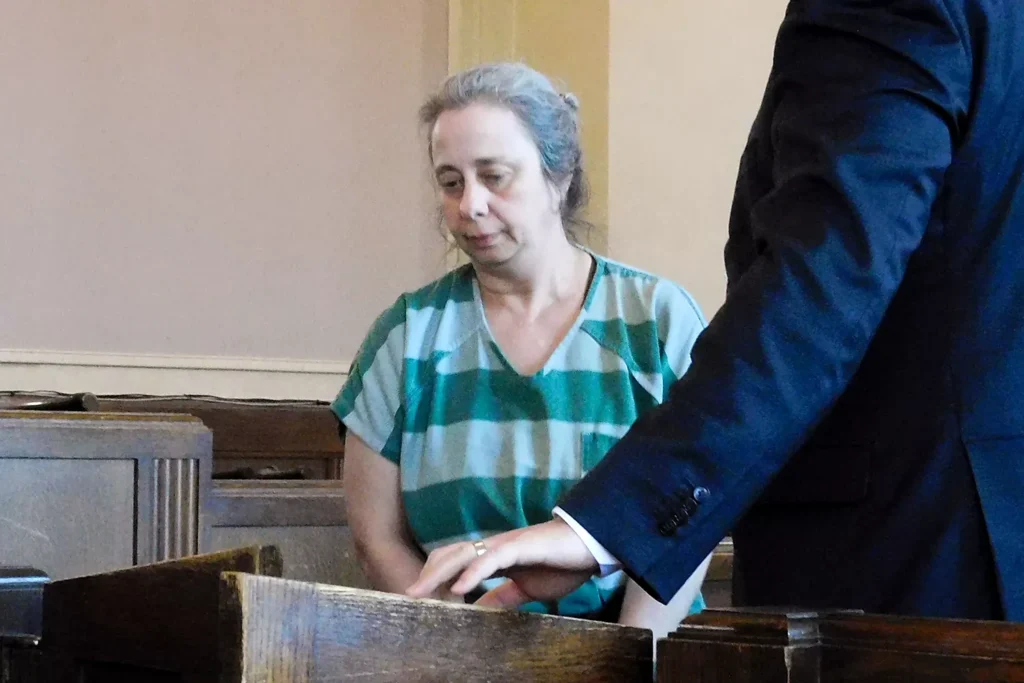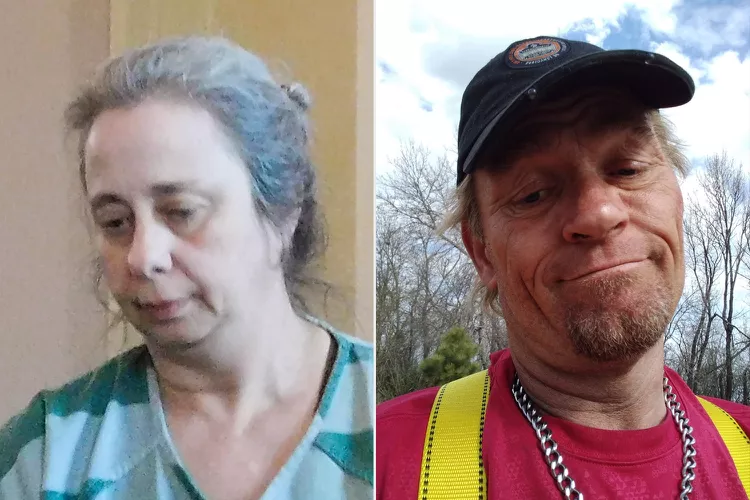In a chilling tale of greed, deception, and tragic misunderstanding, a North Dakota woman has been sentenced for poisoning her boyfriend, believing she would inherit a slice of a non-existent fortune. The story of Ina Kenoyer and her boyfriend Steven Riley Jr. unfolds like a twisted crime drama, with a deadly cocktail of antifreeze, betrayal, and a scam that never should have been believed.
A Scam with Deadly Consequences
The heart of this case lies in an online scam that led to devastating consequences. Ina Kenoyer, 48, poisoned her boyfriend of 10 years, 51-year-old Steven Riley Jr., after being convinced that he was about to inherit $30 million. According to Ward County court documents, Kenoyer believed that she would be entitled to a share of this inheritance, given their long relationship. But as the facts later revealed, there was no inheritance, and it was all a scam—an illusion that cost Riley his life and left Kenoyer behind bars.
On September 3, 2023, the day Riley was supposed to meet with a lawyer to discuss the supposed inheritance, Kenoyer made a fateful decision. She poisoned Riley’s sweet tea with antifreeze, masking the deadly taste in a beverage he unsuspectingly drank. Riley’s condition deteriorated over the next two days, and despite pleas from his friends to seek medical help, Kenoyer dismissed his symptoms as heat stroke and delayed getting him any real treatment.
The World’s Biggest Pearl: A Filipino Fisherman Slept Next to a $100 Million Treasure for 10 Years
False Hopes of Wealth and a Planned Breakup
According to friends and court documents, Steven Riley had confided that once he received his multi-million-dollar windfall, he intended to break up with Kenoyer. Whether or not this breakup was inevitable is unknown, but investigators suggest that this information likely fueled Kenoyer’s drastic actions. The inheritance, however, turned out to be entirely fake, the result of an online scam that duped Riley into believing he was on the verge of receiving an enormous sum of money.
In the days following the poisoning, Kenoyer continued to hide the truth, telling friends that Riley had visited a walk-in clinic and was recovering from heat stroke. By the time authorities were called to Riley’s home on September 5, it was too late. Riley was airlifted to a hospital, where he was pronounced dead from ethylene glycol poisoning—the key ingredient in antifreeze.
A Chilling Confession
Kenoyer initially tried to cover up her actions, telling investigators that Riley had been drinking heavily on the day of his illness. However, the autopsy revealed no traces of alcohol in his system, directly contradicting her story. After a thorough investigation and the discovery of a Windex bottle containing antifreeze, Kenoyer finally confessed to spiking Riley’s tea with the deadly substance.
In her mind, this was a necessary evil to secure a future alongside Riley’s inheritance—a future that never existed.
The Courtroom Drama and Sentencing
In October 2024, after pleading guilty to murder, Kenoyer was sentenced to 25 years in prison, followed by 10 years of probation. She was also ordered to pay $3,455 in restitution to Riley’s family. The sentencing hearing was an emotional one, as Riley’s family members expressed their devastation and anger over the senseless loss of their loved one.
Ryan Riley, Steven’s son, confronted Kenoyer in court, stating, “To have you take away someone so important, it’s just hurtful. I can’t even find the words to describe how I feel and how much it burdens everyone. I just wish none of this ever happened.”
Steven’s sister, Stephanie Gonzalez, also spoke about the immense toll Kenoyer’s actions had taken, saying, “You stole a father from five sons, a brother from two sisters, an uncle from 12 nieces and nephews, and a great uncle to eight, and many friends. How does it feel to have taken so much for absolutely nothing?”
A Scam That Never Should Have Been
What makes this tragedy even more unbearable is that the inheritance Kenoyer so desperately sought didn’t exist. Riley, it turns out, had fallen victim to an elaborate scam, likely perpetrated online. Investigators are still trying to determine who convinced Riley he was about to receive a $30 million fortune, but the consequences of that deception are already clear. One man is dead, and another life—Kenoyer’s—is ruined by greed and a false belief in easy money.
This case is a stark reminder of the dangerous power of online scams and how quickly they can spiral out of control. What began as an apparent opportunity for wealth ended in a tragic murder fueled by greed, misinformation, and desperation.

The Legal Aftermath and Restitution
While Kenoyer faces the consequences of her actions, the financial and emotional toll on Riley’s family remains. The court’s restitution order for $3,455—though a small amount compared to the gravity of the crime—was meant to help cover some of the family’s expenses, but it can never replace the life that was taken. The legal process is concluded, but for Riley’s family, the emotional scars will likely last a lifetime.
Beware of Scams
This tragic story is a wake-up call for everyone to be vigilant about online scams and too-good-to-be-true promises of wealth. If you or someone you know is targeted by a suspicious financial offer, seek advice from trusted professionals before making any decisions. Scammers often prey on people’s hopes and vulnerabilities, leading to devastating consequences like those seen in this case.
If you’re ever in doubt, do your research, and never trust an inheritance from a source you can’t verify. Scams can destroy lives, and this one—despite its fraudulent roots—cost a man his life and a woman her freedom.
For those experiencing domestic violence or being manipulated in toxic relationships, help is available. The National Domestic Violence Hotline offers support 24/7 at 1-800-799-7233 or online at thehotline.org.
This story is a sobering example of how easily dreams of quick wealth can turn into nightmares. Don’t let yourself be fooled by empty promises—be smart, be safe, and always verify.
Stay informed and share this story to help others avoid falling victim to similar scams. If you or someone you know is in a dangerous situation, don’t hesitate to reach out to professionals for help.

